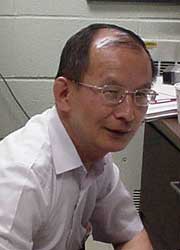
Ph.D. - 1972 - Indiana University
Postdoc - 1972-73 - Purdue University
Our research programs are focused on the discovery and mechanistic characterization of bioactive natural products, and the bioorganic chemistry of biologically active molecules derived from natural or synthetic sources.
One of our major research efforts is aimed at the discovery of novel antitumor agents from higher plants. The isolation of active constituents in plants is directed by specific bioassays, including effects on (a) killing human tumor cells in culture (non-small cell lung cancer A549, colon cancer HT-29, breast cancer MCF-7, prostate cancer PC-3, kidney cancer A-498 and pancreas cancer PaCa-2), (b) modulating multidrug resistance tumor cells, (c) inhibiting protein tyrosine kinases, (d) modulating protein kinase C, (e) antimitosis, and (f) inhibition of oncogen-dependent growth or modulation of oncogene-specific morphological differentiation. The active constituents are separated and purified by a variety of chromatographic and other physical methods. The structures are determined using sophisticated spectroscopic and chemical methods. Moreover, chemical synthesis of active constituents and their analogs is also an important part of this research program.
Our second research effort is directed toward the design and development of taxol production technology from renewable natural sources. Taxol is a novel, naturally occurring compound with a highly complicated diterpene skeleton. Serious difficulties in the isolation of pure taxol from yew plants have resulted in unusually high costs for the treatment of ovarian, breast and lung cancers. Our approach is to focus on the production of taxol and other taxanes from yew needles/twigs. An optimal production technology should exclude traditional fractionation (partition processes) and usage of toxic solvents. The chromatographic separation must not depend on the expensive absorbents. In addition, the selection of high taxol-producing vari-eties of cultivated yews is also critical to the development of this production technology.
We also are studying noncovalent hydrophobic interactions that govern the regiospecificity and stereo-specificity of many enzymic reactions. Various cyclodextrin (cyclic oligosaccharide) inclusion complexes are useful for hydrophobic molecular recognition studies and serve as biomimetic models for serine proteases and esterases. This molecular recognition process has also been utilized in the design of regio- and stereospecific transformations of bioactive compounds. In addition, we have further extended these inclusion studies by molecular micro-encapsulation of bioactive substances for modulation of their physical and chemical properties and thus control of their bioavailabilities.
H. Zhang, X. Li, C.L. Ashendel, and C.-j. Chang, "Bioactive compounds from Psorothamnus junceus," J. Nat. Prod. 63, 1244-1248 (2000).
Xu, W.-C.; Zhou, Q.; Ashendel, C.L.; Chang, C.-t.; Chang, C.-j. "Novel Protein Kinase C Inhibitors: Synthesis and PKC Inhibition of beta-Substituted Polythiophene Derivatives," Bioorg. Med. Chem. Lett. 9, 2279-2282 (1999).
McLaughlin, J.L.; Chang, C.-j. "Simple (Bench-top) Bioassays and the Isolation of New Chemically Diverse Antitumor and Pesticidal Agents from Higher Plants," Recent Adv. Phytochem. 71, 243-246 (1999).
Chang, C.-j.; Ashendel, C.L.; Chan, T.C.K.; Geahlen, R.L.; McLaughlin, J.L.; Waters, D.J. "Oncogene Signal Transduction Inhibitors from Chinese Medicinal Plants," Pure Appl. Chem. 71, 243-246 (1999).
Chang, C.-j.; Ashendel, C.L.; Chan, T.C.K.; Geahlen, R.L.; McLaughlin, J.L.; Waters, D.J.; Xu, W.-C. "Discovery and Development of Antitumor Agents from Medicinal Plants," Proc. Intl. Sym. Nat. Prod. Sci. 3-12 (1999).
P. Heinstein, J.-y. Zhou, M. Wang, Y.-C. Liu, X.-y. Chen, D. Chen, S. H. Hoke, R. G. Cooks, and C.-j. Chang, "Taxol and Taxane Formation in Plant Cell Culture," J. Chem. Soc. Perkin I, 845-851 (1996).
C.-j. Chang, C. L. Ashendel, R. L. Geahlen, J. L. McLaughlin, and D. J. Waters, "Oncogene Signal Transduction Inhibitors from Medicinal Plants," In Vivo, 10, 185-190 (1996).
X. Li and C.-j. Chang, "Antitumor Cytotoxicity and Stereochemistry of Polyketides from Goniothalamus amuyon," Nat. Prod. Letters, 8, 207-215 (1996).
A. M. Hall, V. Croy, T. Chan, and C.-j. Chang, "Bicinchoninic Acid (BCA) Protein Assay in the Determination of Adriamycin Cytotoxicity Modulated by the MDR Glycoprotein," J. Nat. Prod., 59, 35-40 (1996).
Q. Ye, X.-m. Gu, L. Zeng, G.-x. Zhao, C.-j. Chang, J. L. McLaughlin, and S. Sastrodihardjo, "Persealide: A Novel, Biologically Active Component from the Bark of Persea americana," Int. J. Pharmacognosy, 34, 70-72 (1996).

